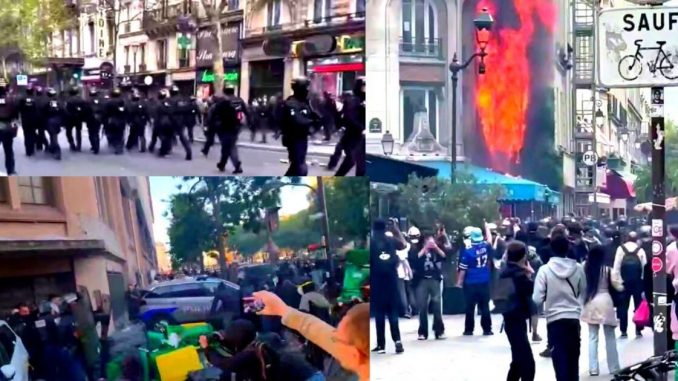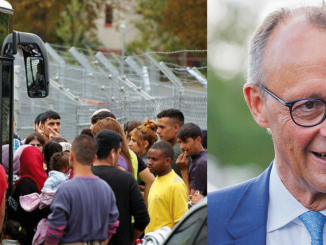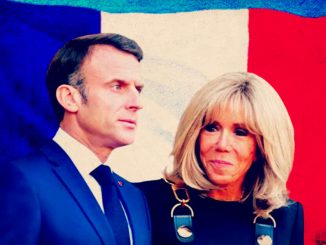
Published September 10, 2025
On September 10, 2025, France’s new Prime Minister, Sébastien Lecornu, faced immediate and intense challenges as nationwide protests erupted under the “Block Everything” movement. The demonstrations, sparked by widespread discontent over austerity measures and political instability, coincided with Lecornu’s appointment following the resignation of his predecessor, François Bayrou, who had been ousted after a no-confidence vote.
A Nation in Turmoil
The “Block Everything” protests, organized largely through social media platforms like Telegram, saw approximately 175,000 demonstrators across France. Protesters blocked highways, set fires, and clashed with police in cities including Paris, Marseille, Lille, and Lyon. In Paris, groups of protesters attempted to block the city’s beltway during the morning rush hour, leading to confrontations with riot police deploying tear gas. Authorities reported over 260 street fires and the deployment of 80,000 police officers nationwide, resulting in 473 arrests.
Lecornu’s Pledge Amidst Crisis
Sébastien Lecornu, a close ally of President Emmanuel Macron and former defense minister, assumed office as France’s fifth prime minister in under two years. In his inaugural address, Lecornu acknowledged the country’s political instability and economic challenges, emphasizing the need for innovative solutions and a “profound break” with past governance approaches. He expressed hope for reform and pledged to collaborate with opposition parties to address France’s budget deficit, which stands at 5.8% of GDP.
Public Sentiment and Opposition
The appointment of Lecornu has been met with skepticism and criticism from various political factions. Opposition parties, including the far-left France Unbowed and the far-right National Rally, have expressed disapproval of the new prime minister’s policies. Marine Le Pen, leader of the National Rally, dismissed Lecornu’s appointment, predicting another failure of Macron’s leadership. Protesters view Lecornu’s appointment as a continuation of Macron’s unpopular austerity policies, fueling further unrest.
A Nation Divided
The events of September 10 underscore the deepening divisions within French society and the challenges facing the Macron administration. With a fragmented legislature and widespread public discontent, Lecornu’s ability to navigate the political landscape and implement effective reforms remains uncertain. As France grapples with economic pressures and political instability, the coming months will be critical in determining the direction of the nation’s future.
👥 Public/Political Reactions
🇫🇷 Public Response: Mass Protests and Public Discontent
Nationwide demonstrations erupted under the “Block Everything” movement, with approximately 175,000 protesters mobilizing across France. Participants, including students, teachers, healthcare workers, and members of the “Yellow Vest” movement, expressed their frustration over economic austerity measures and perceived political indifference. Protests involved roadblocks, burning barricades, and clashes with police, leading to over 300 arrests nationwide. The movement, initially organized via social media, has drawn comparisons to the 2018–2019 Yellow Vest protests.
🏛️ Political Reactions: Opposition and Parliamentary Challenges
Lecornu’s appointment has been met with skepticism from various political factions. The far-left party La France Insoumise has filed a no-confidence motion against him, while the far-right National Rally has indicated conditional support for budget negotiations, contingent upon their demands being met. This fragmented political landscape presents significant challenges for Lecornu in securing the necessary parliamentary support to pass legislation.
⚠️ Resulting Effects
🔥 Social Effects
-
Widespread Civil Unrest: The “Block Everything” protests led to road blockades, burning barricades, and clashes with police in major cities like Paris, Marseille, Lyon, and Lille.
-
Arrests and Injuries: Over 473 arrests were reported, with multiple injuries among both protesters and law enforcement.
-
Disruption of Daily Life: Transport networks, schools, and businesses faced significant disruptions, especially during rush hours, highlighting the intensity of public frustration.
🏛️ Political Effects
-
Parliamentary Challenges: Lecornu faces a fragmented legislature, with opposition parties like La France Insoumise and the National Rally challenging his policies.
-
No-Confidence Motions: The far-left filed motions of no confidence, increasing political instability and questioning Macron’s government credibility.
-
Policy Delays: Key reforms and budgetary measures are likely to be delayed due to protests and legislative gridlock.
💰 Economic Effects
-
Market Uncertainty: France’s financial markets experienced short-term volatility due to political instability and anticipated strikes or blockades.
-
Business Disruption: Local businesses, particularly in Paris and other major cities, saw declines in sales due to blocked roads and unrest.
-
Tourism Impact: The unrest and negative media coverage have the potential to affect tourism temporarily, especially in urban centers.
🌐 International Effects
-
Global Attention: Media worldwide, including The Gateway Pundit, NY Post, and Reuters, highlighted France’s turmoil, potentially affecting France’s diplomatic image.
-
Investor Caution: Foreign investors may adopt a cautious stance until political stability is restored, particularly given France’s role in the EU economy.
⚠️ Long-Term Effects
-
Public Distrust in Government: Continued unrest reinforces skepticism about Macron’s policies and Lecornu’s ability to implement reforms.
-
Potential for Further Unrest: If economic pressures and unpopular austerity measures persist, protests could escalate, possibly leading to more organized nationwide strikes.
-
Policy Reevaluation: The government may be forced to adjust austerity measures or negotiate with opposition factions to restore calm.
🔮 Future Outlook
🔮 Political Outlook
-
Navigating a Fragmented Legislature: Lecornu faces a divided parliament, with far-left and far-right factions opposing key reforms. His ability to secure support for legislation, especially on austerity and budgetary measures, will be critical.
-
Potential for Further Political Instability: If opposition parties continue to block initiatives or if no-confidence motions gain traction, France may face frequent government crises, similar to the turnover of previous prime ministers.
-
Reform Opportunities: Lecornu’s pledge for a “profound break” with past governance could lead to moderate reforms, potentially easing public discontent if executed effectively.
🌐 Social Outlook
-
Protest Fatigue vs. Escalation: Public unrest may continue, especially if austerity policies remain. However, sustained protests could eventually lose momentum due to fatigue or police crackdowns.
-
Community Divisions: The protests highlight deep societal divisions, with urban workers, students, and rural communities often at odds with government policies. These tensions may persist or widen.
💰 Economic Outlook
-
Short-Term Market Volatility: The initial unrest has already caused economic disruptions. Continued political instability may deter investment or affect France’s financial markets temporarily.
-
Pressure to Adjust Policies: To stabilize the economy, the government may need to modify austerity measures or introduce economic incentives, especially if protests affect business operations and tourism.
🌍 International Outlook
-
Global Perception: France’s image as a stable European nation may be slightly tarnished, influencing foreign investor confidence and diplomatic relations.
-
EU Relations: The European Union may closely monitor France’s handling of protests and economic reforms, particularly as France is a major EU contributor.
🧩 Bottom Line:
The appointment of Sébastien Lecornu as France’s new prime minister has laid bare the deep divisions within French society and the challenges of governance under President Macron. Nationwide “Block Everything” protests reflect widespread frustration with economic austerity, political indecision, and a perceived disconnect between the government and the public.
While Lecornu promises reform and a “profound break” from previous policies, his path is fraught with obstacles: a fragmented legislature, skeptical opposition parties, and a populace ready to resist unpopular measures. The resulting civil unrest, economic disruption, and international scrutiny underscore the high stakes for France’s political and social stability.
Ultimately, France stands at a crossroads. The ability of Lecornu—and by extension Macron’s administration—to navigate these turbulent waters will determine whether the nation can restore order and confidence, or whether continued unrest and political gridlock will define the coming years.
SOURCES: THE GATEWAY PUNDIT – PARIS IS BURNING – AGAIN: New Prime Minister Lecornu Has a First Day of Hell With Widespread Protests, Violence and Destruction (VIDEOS)
THE NEW YORK POST – 250 protesters intending to ‘block everything’ arrested in France as Macron installs new PM





Be the first to comment